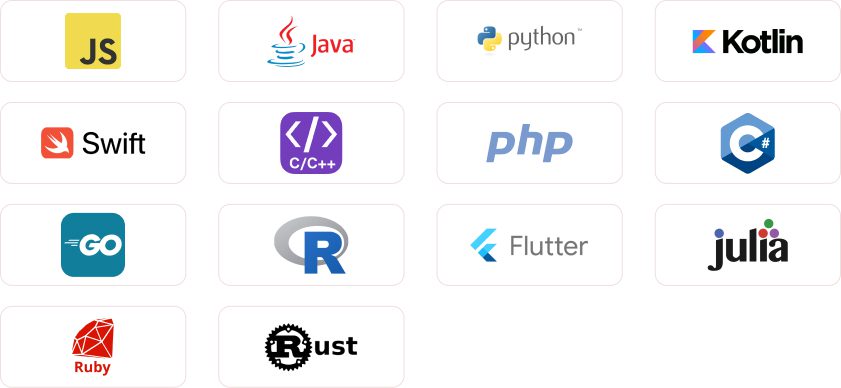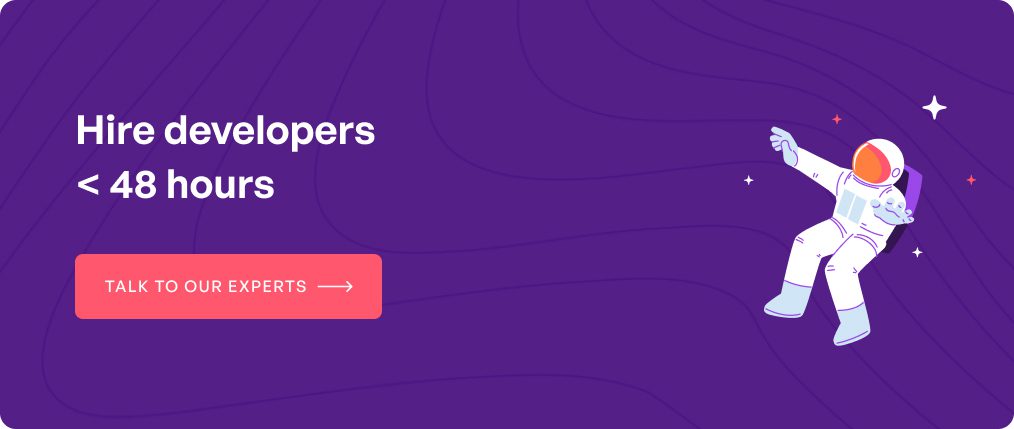The mobile application development domain is constantly changing. The technologies like blockchain, generative AI, and mixed reality which were once unheard have today become a critical part of the digital landscape.
In order to keep up with these ever changing technologies, it is critical for developers to be updated with the top mobile app development languages.
In this article, we are going to deep dive into the best programming languages for app development which the developers should learn in order to upskill and remain in demand in 2024.
Table of contents
2024’s best mobile app development languages
While the technologies are constantly expanding along with the mobile app development languages that support them, there are some languages which have been time-tested for building robust applications. Let us look into a mix of them and the up and coming languages to consider for growing your development career.

JavaScript
JavaScript (JS) is a computer programming language that is used for making apps and websites and applications dynamic, interactive. It’s deemed unique because it runs directly on your browser, not simply on a server.
The language, along with HTML and CSS, is known to be one of the most commonly used programming languages. So much so that as of March 2023, 98.4% of all websites use JavaScript. Together, the three languages create user-facing elements of websites and online applications.
The language is used for making dynamic websites, web and mobile apps, games, web servers, backend infrastructures, and more.
The following are the most common uses of JavaScript.
- Web development
- Web-based games and applications
- Server-side programming
- Mobile app development
- Artificial Intelligence
Java
Java is a programming language commonly used for building software that is compatible with multiple operating environments. It is a two-phased programming language – compiled and interpreted. However, it varies from other compiled languages since it doesn’t compile to an executable file directly.
In Java, code gets compiled first and then gets translated in a binary form known as Java Byte Code. Then, JBC gets compiled and then interpreted in native language required for running in the target operating environment. This is a key benefit for developers since it means they can write code once and run it anywhere.
Python
Python is a general-purpose, high-level, and interpreted programming language generally utilized in multiple future-forward sectors such as artificial intelligence, machine learning, web development, data analysis, and many more.
Known as the best language to build an app, it is admired by developers for its ease of use, robust standard library, and dynamic semantics. Another strength of the language comes from its massive community of developers who contribute towards its growth with a dedicated focus on making it easier for developers to read and understand, while reducing the lines of code.
The different applications of Python include –
- Web development
- AI models
- CAD designs
- Data analysis and machine learning
- Games
Kotlin
Kotlin is a general-purpose, statically typed programming language built by Jet Brains which comes with combined features of functional programming and object-oriented programming. The language is interoperable with Java which signifies that the languages can easily share and use the information. Another similarity lies in the fact that just like the java compiler, Kotlin compiler is also able to generate the byte code, which can also run on JVM.
Already established as the best language for android development, Kotlin for mobile app development is widely used for developing server-side applications, multiplatform mobile development, and much more.
Swift
Swift is a multi-paradigm, general-purpose, object-oriented, imperative, functional, and block-structured language built by Apple as a reliable iOS app development language. It is built to be compatible with the Cocoa and Cocoa Touch frameworks along with Objective-C codes for Apple products, making it easier to build iOS applications.
Some of the USPs that are associated with Swift include –
- Rapid development process – Swift comes with simplified syntax and grammar, making it easy to write and read. The language is very concise in nature meaning less number of codes is needed for performing the same tasks as compared to Objective-C.
- Easier to scale – Swift enables you to build a software that is completely future-proof and can get extended with new features and development team as needed.
- Improved performance – Swift is built on the LLVM compiler framework, which is known to translate assembly language into machine code and in turn, optimize the codes, making the development journey faster. Additionally, it comes with a strong typing system and error handling feature that prevents code errors and crashes in the production stage.
These benefits which Swift offers, has brought it on a path to become the best iOS app development language, especially when compared to its predecessor Objective-C.
C/C++
C++ is one of the most used high-level and object-oriented programming languages. It allows developers to write efficient and clean codes for projects like – large applications, game development, software development, and even operating system programming. Built to be an expansion of the C programming language, C++ also includes Object Oriented Programming (OOPs).
With its syntax similar to Java, C, and C#, C++ programming language is often considered one of the easy-to-learn languages for beginner developers.
PHP
PHP is a server-side scripting language built specifically for web and mobile application development. The fact that it is open-source makes the language extremely easy to use for developers. Moreover, what differentiates it from client-side languages like JavaScript is that its code gets executed on the server, and a HTML is generated to be sent to the client.
Being one of the reliable programming language for app development, PHP offers a number of benefits ranging from – easy maintenance, availability of a wide range of libraries, high flexibility, and easy customizations.
C#
C#, one of the best programming languages for mobile app development, is a versatile, powerful object-oriented programming language built by Microsoft. Being a crucial part of the .NET framework, the language is used for a number of app development activities.
C# is known to merge system-level control and high performance of languages like C and C++ and the simplicity of Java, making it a popular choice for quality focused developers.
Backed by a strong typing and modern feature set, the language enables developers to build a range of applications, consisting of web applications, desktop software, and mobile apps. Its extensive library and support for component-based architecture makes the language ideal for creating Windows applications, web services, and even game development with platforms like Unity3D.
C# continues to grow with every new version by enhancing its capabilities and establishing its criticality in the software development space.
Golang
Go, also called Golang, is an open-source programming language developed by Google. It’s designed with simplicity and efficiency in mind for both development and execution. The language is known for its concurrency support, making it ideal for the creation of scalable and high-performance apps. Moreover, it comes with a clean and straightforward syntax, which enables developers to write efficient code quickly.
Go’s standard library and robust tools improves productivity, and its static typing helps with catching errors right at the early stages of application development. On the back of its speed, simplicity, and strong community support, Go has gained popularity in various domains, from web development to system programming.
The language’s focus on performance and ease of usage makes it an extremely compelling choice for modern-day software development.
R
R is an open-source and versatile programming language and environment extensively used in statistical computing and data analysis. Developed by statisticians and data scientists, R provides a wide range of packages and libraries for tasks like data manipulation, visualization, and statistical modeling. Its proficiency in data exploration and statistical analysis has made it a preferred choice among researchers and data professionals.
R is prized for its flexibility and extensibility, allowing users to create custom functions and packages. Its exceptional plotting capabilities enable the creation of high-quality data visualizations. With a robust community and widespread adoption in fields such as bioinformatics and data science, R remains a pivotal tool for data analysis and statistical research.
Flutter
Aiming to become the best language for android development, Flutter is an open-source UI software development kit built by Google. It is a powerful tool for building cross-platform applications using Dart programming language and a widget-based architecture, which allows developers to build a visually rich and highly customized user interface.
What makes Flutter programming language stand out is its capability to compile natively for various platforms like iOS, Android, and even web and desktop, from a single codebase. This speeds up development, saves time, and guarantees consistent user experience across multiple devices. With extensive libraries and a growing community, Flutter has found popularity for its efficiency and native-like design capabilities, making it a top choice for developers looking to create visually appealing, features-rich cross-platform applications.
Julia
Julia is a high-level, high-performance, and open-source programming language designed specifically for technical and scientific computing. It was built to solve the limitations of current programming languages for mobile app development when it comes to computational and numerical activities. Julia is known for its speed, which is at par with low-level languages like C and Fortran, making it an amazing choice for machine learning, data analysis, and scientific research.
What sets Julia apart is its just-in-time (JIT) compilation, which enables faster execution of code. It also features a dynamic type system, multiple dispatch, and a straightforward and expressive syntax which is easy for the developers to learn and use. The language also boasts of a vast ecosystem of packages and libraries, enabling users to access a wide range of tools and resources for their projects. Due to its performance and versatility, it has gained popularity for building mobile app development services like data science, finance, and engineering, where rapid computation is crucial.
Ruby
Ruby’s open-source and dynamic language with its clean and intuitive syntax, along with the object-oriented nature, enables the developers to write a concise and readable set of code, making it a fantastic choice for web application development.
One of Ruby’s standout features is the Ruby on Rails framework, which has revolutionized web development by focusing on convention over configuration. This framework, often known as Rails, supports a rapid development of web applications, making it a popular choice for startups and established companies.
Ruby’s strong community support has led to a rich ecosystem of libraries, enabling developers to access pre-built functionalities and streamlining their work. With its focus on developer productivity, Ruby has become a favorite among developers for various app types, specifically scripting and web development.
Rust
Rust is a system programming language famous for its focus on safety, performance, and reliability. Its functionalities make it an excellent choice for creating low-level systems like operating systems, game engines, and embedded applications. Some of its prime benefits include:
- Memory safety: Rust’s ownership system eliminates common programming bugs like null pointer dereferences and data races.
- High performance: Rust achieves performance comparable to languages like C and C++ due to low-level control and optimization capabilities.
- Concurrent programming: It backs safe concurrent programming via its ownership model, making it easy to write thread-safe code.
- Community and ecosystem: Rust has a fast growing community and a rich ecosystem of tools and libraries.
- Cross-platform: Rust compiles to a variety of platforms thus improving portability.
These functionalities make Rust a preferred choice for developers who are looking to create a robust and efficient system software.
So here are the different programming languages that are changing the mobile application development services for the better by making the apps more robust, scalable, and technology advancement friendly.
At Neojn, we take pride in the fact that our team comprises developers who carry an extensive experience in multiple languages and technologies, making them your ideal partner in the journey of digital transformation. Looking for a similar team of experts? Get in touch with our business development team today.


